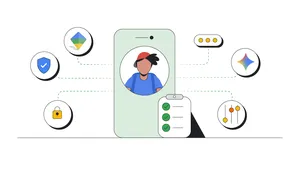3 ways teens are managing tech this summer

To better understand what teens really think about tech, we partnered with youth research experts at Livity, an agency elevating young voices, to produce the “Future Report: a project consulting 7,000 young people aged 13-18 across Europe.” The final report — which will include new statistics on AI and learning — will be published in September.
Today we’re sharing three highlights from teen opinions on wellbeing and online safety.
1. Teens are finding balance and asking for support
As school holidays begin and teens have more free time, the survey showed that teens want to balance their time on and offline. Teens were aware of the impact of too much screen time on their mental and emotional health:
- 57% say they’ve found a balanced relationship between online and offline life.
- 80% feel they manage their digital habits well — particularly with what and who they share content with online.
The survey also revealed they’re using simple but effective strategies to balance online and offline time and manage their mental health and happiness:
- 43% say they spend more time with family and friends
- 31% say they focus on offline hobbies.
- 30% report exercising.
- And 25% say they set their own screen time limits.
Importantly, three in four teens are already using tech to support their mental and physical wellbeing — from sleep tracking to mindfulness and fitness apps. At the same time, they want platforms to support that wellbeing proactively with built-in controls, like YouTube’s “Take a Break” reminders for teen accounts or Family Link’s schooltime and bedtime settings. “I go out to be with friends, to spend time, joke around and play together, not to sit on a bench and start scrolling our phones,” 15-year-old Anita from Italy reported in the survey.
2. Teens trust parents’ advice, and need proactive support, too
Despite being digital natives, teens still turn to parents and guardians first when they face challenges online:
- 68% would go to a parent about scams or fraud.
- 63% would go to a parent about cyberbullying or harassment.
- 58% would go to a parent about uncomfortable online interactions.
- 57% would go to a parent about privacy settings and security concerns.
The majority of teens report that their parents use tools like screen-time controls, app settings or account supervision, but only 31% felt their parents understood online information well. There are resources for this kind of help, like our various tools specifically for families. There’s also Google’s Meet LEO training program, which gives caregivers and educators across Europe the knowledge and confidence to support digital wellbeing at home and in schools. “
3. Teens need tools, trust and two-way conversations
The survey showed us that teen wellbeing online isn’t just about screen time. It’s about:
- Giving young people tools they can trust;
- Empowering them to make informed choices;
- Supporting parents and educators with easy-to-use controls;
- And most of all, listening to what teens say they need.
As 17-year-old Szymon from Poland put it, “Online gives me a voice, offline gives me a purpose.” The internet will continue to evolve, so we’ll keep learning, listening and building age-appropriate tools that help young people feel safe, seen and supported online. Check back later this year when we share the final results of the report.








